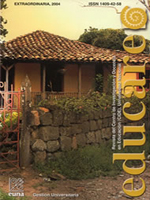La gestión de la calidad institucional en la Universidad Nacional, Costa Rica
DOI:
https://doi.org/10.15359/ree.2004-Ext.5Abstract
Proposal on the convenience of constructing a broad, integrated concept of quality management that includes academic aspects, support services and the management itself. It is set forth based on the experience achieved at Universidad Nacional on institutional quality management from 2000 to 2004; it has been supported by Dutch cooperation programs. Adopting an approach that fits together strategic aspects with constructivist and participative processes has afforded the construction of a culture and a vision of a future of quality. Some of the improvements account for achievements such as the diversification of decision making, self evaluation for self improvement or for accreditation purposes of study programs, and the establishment of improvement teams for management services. It is also acknowledged that by adopting an institutional quality management position, a gap is created between the current management procedures and those presented in the proposed model. Closing this gap will require academic authorities to play new roles and to understand that in order to build high-quality university management, it is necessary to work with a lot of precision and professionalism.
References
Bacharach, S. B.; Bamberger, P. y Con.ley, S. C. (1991). Negotiating the "see-saw" of managerial strategy: a resurrection of the study of professionals in
organizational theory. Research in sociology of organizations (8), 217-238.
Baldridge, J. V. (1983). Organization characteristics of colleges and
universities. In Baldridge and Deal. The dynamics of organizational change in education. Berkekey: Me Cutchan Publishing Corporation, 38-59.
Díaz-Barriga, A. (2002). La evaluación en el marco de las políticas hacia la educación superior: Retos y perspectivas. Seminario: Desarrollo de la calidad en universidades de América Latina. México, 2001. Eschbom. GTZ: 24-40.
Ellstrom, P. (1983). Four faces of educational organizations. Higher
Education (Arnsterdam) 12 (1983), 231-141.
España, O. (1998). Filosofía e historia de la Universidad En España, O. Universidad Nacionál, Historia y Utopía. Heredia Editorial Fundación UNA, pp. 29-52.
European Foundation for Quality Management. 1999. Method for improving the quality of higher education based on the EFQM model. Netherlands: HBO Expert Grup.
Kaplan, R. y Norton, D.P. (2001). Cómo utilizar el cuadro de mando integral.
Barcelona: Gestión 2000.
Korte, R. (2002). Gestión de calidad: experiencias de la industria y el sector de servicios para ser aprovechadas en las universidades. Seminario: Desarrollo de la calidad en universidades de América Latina. México, 2001. Eschbom: G1Z: 41-53.
Lepeley. M. E. 2001. Gestión y calidad en educación. Un modelo de evaluación. Santiago: Me Graw Hill.
Mintzberg. H. (1983). Toe profesional bureaucracy. In Structures in five. Designing effective organizations. Englewood Cliffs: Prentice-Hall, pp. 189-213.
Mintzberg. H. (1988). La organización profesional. En Mintzberg, H. y
QUINN, J. B. 1988. El proceso estratégico. Conceptos, contextos y casos.
Miranda, R.; Marín, O.; Ríos, M.; Mora, G.; Gutiérrez, l. y Hemández, C. (2001). La gestión universitaria en cuatro universidades colombianas. Heredia. Universidad Nacional.
Mora, J. (1998). Veinticinco años construyendo el futuro. En España, O. Universidad Nacional, Historia y Utopía. Heredia Editorial Fundación UNA, pp. 13-27.
Núñez, B. (197 4). Hacia la universidad necesaria Heredia: Universidad Nacional.
Núñez,B. (1983). Una universidad de excelencia. En España, O. Universidad Nacional, Historia y Utopía. Heredia. Editorial Fundación UNA, pp. 56-57.
Universidad Nacional (2004). Acuerdos Generales del Consejo Universitario. SCU-894-2004. Una Gaceta (11), 7-8.
Universidad de Antioquia. (1997). Estatuto General. Acuerdo Superior Nº 1 del 5 de marzo de 1997. Medellín.
Published
How to Cite
Issue
Section
License
1. In case the submitted paper is accepted for publication, the author(s) FREELY, COSTLESS, EXCLUSIVELY AND FOR AN INDEFINITE TERM transfer copyrights and patrimonial rights to Universidad Nacional (UNA, Costa Rica). For more details check the Originality Statement and Copyright Transfer Agreement
2. REUTILIZATION RIGHTS: UNA authorizes authors to use, for any purpose (among them selfarchiving or autoarchiving) and to publish in the Internet in any electronic site, the paper´'s final version, both approved and published (post print), as long as it is done with a non commercial purpose, does not generate derivates without previous consentment and recognizes both publisher's name and authorship.
3. The submission and possible publication of the paper in the Educare Electronic Journal is ruled by the Journal’s editorial policies, the institutional rules of Universidad Nacional and the laws of the Republic of Costa Rica. Additionally, any possible difference of opinion or future dispute shall be settled in accordance with the mechanisms of Alternative Dispute Resolution and the Costa Rican Jurisdiction.
4. In all cases, it is understood that the opinions issued are those of the authors and do not necessarily reflect the position and opinion of Educare, CIDE or Universidad Nacional, Costa Rica. It is also understood that, in the exercise of academic freedom, the authors have carried out a rogorous scientific-academic process of research, reflection and argumentation thar lays within the thematic scope of interest of the Journal.
5. The papers published by Educare Electronic Journal use a Creative Commons License:














 The articles published by Educare Electronic Journal can be shared with a Creative Commons License:
The articles published by Educare Electronic Journal can be shared with a Creative Commons License: 



